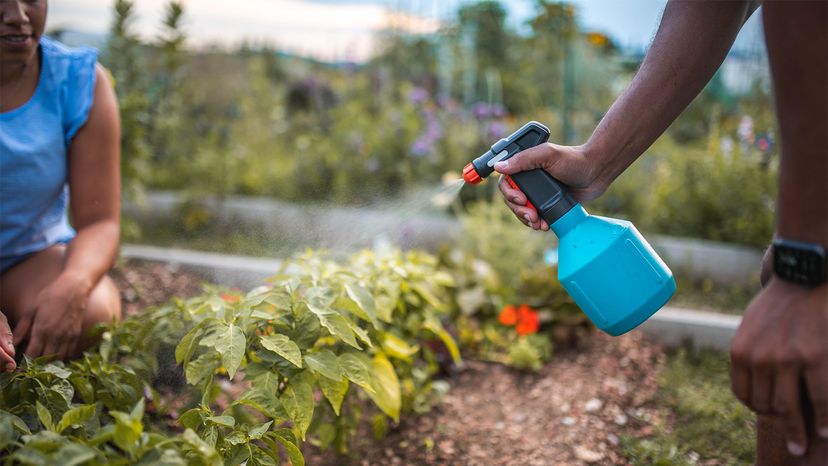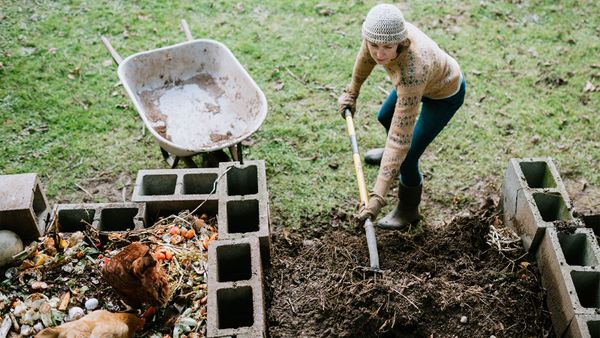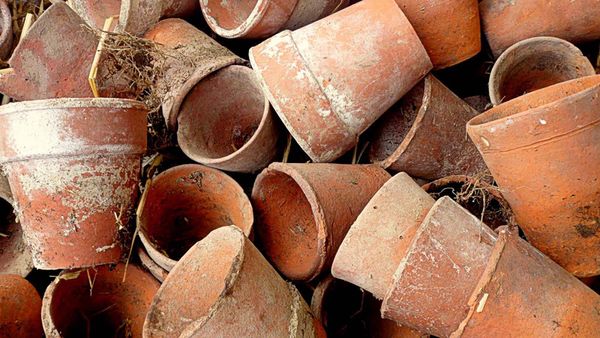1. Tomato Leaf Spray
Tomato leaf spray is effective for killing aphids and mites. It works because the alkaloids in the tomato leaves (and the leaves of all nightshades, actually) are fatal to many insects. Simply soak 2 cups (473 milliliters) of chopped tomato leaves in 2 cups of water overnight. Strain the liquid the next day and discard the leaves. Add 2 more cups of water to the mixture and spray it on your plants.
2. Garlic Oil Spray
Garlic oil spray is a great, safe insect repellent. Simply put three to four cloves of minced garlic into 2 teaspoons (10 milliliters) of mineral oil. Let the mixture sit overnight, and then strain the garlic out of the oil. Add the oil to 1 pint (473 milliliters) of water, and add 1 teaspoon (5 milliliters) of biodegradable dish soap. Store in a bottle or jar, and dilute the mixture when you use it by adding 2 tablespoons (30 milliliters) of your garlic oil mixture to one pint of water.
This mixture works because the compounds in garlic (namely, diallyl disulfide and diallyl trisulfide) are irritating or deadly to certain pests (mostly insects). The oil and soap help the mixture stick to plant leaves. What insects does garlic oil repel? Whiteflies, aphids and most beetles will avoid plants sprayed with garlic oil. A word of caution: Don't apply this spray on a sunny day, because the oils can cause foliage to burn.
3. Hot Pepper Spray
Hot pepper spray is a great solution if you have problems with mites. Simply mix 2 tablespoons of hot pepper sauce, a few drops of biodegradable dish soap and 1 quart (0.94 liters) of water and let it sit overnight. Use a spray bottle to apply the spray to infested plants.
Hot pepper spray works because the compound capsaicin, which causes the "heat" in hot peppers, is just as irritating to insects as it is to us (if you've ever sliced a hot pepper and gotten any of it in an open cut, you'll understand). This mixture also helps repel whiteflies, but it may have to be reapplied if you start to see the mites or whiteflies returning.
4. Soap Spray
Simple soap spray is useful in taking out a wide variety of common household pests, including aphids, scale, mites, and thrips. Just add 1 tablespoon of dishwashing soap to 1 gallon of water and spray the mixture on the pests.
Why does this method have guaranteed results? The soap dissolves the outer coating or shell of the insects, eventually killing them.
5. Beer
Sink a tuna can or pie plate into the ground and add a couple of inches of beer, up to about 1 inch (2.5 centimeters) below the top of the container. Beer works because the slugs are attracted to the yeast.
It's really important to sink the container into the soil and keep the beer about an inch lower than the soil. This way, the slugs have to go down after the beer, and they drown. If the beer is near the soil, the slugs can just have a drink and then go and munch some hostas when they're done with happy hour.
6. Citrus Rinds as Slug Traps
If you don't have beer in the house, but you do have oranges, grapefruits or lemons, give this a try. You don't even need to create a spray — simply place the citrus peels on the ground and collect the slugs they attract.
7. Newspaper Earwig Traps
Newspaper earwig traps work well for reducing the population of these sometimes-pesky insects. Just roll up a newspaper and secure it with an elastic band. Dunk it in water to get it wet and lay it in the garden between problem plants. Check the trap daily and dunk the newspaper rolls into a bucket of water to remove the bugs.
8. Cinnamon or Cayenne Pepper
Ground cinnamon or cayenne pepper sprinkled around your plants works by repelling, but not injuring, ants. This approach works just as well for ensuring a bug free home.
9. Red Pepper Spray
Red pepper spray works well for making your plants less tasty to mammal and bird pests. If bunnies, deer, mice, squirrels and birds are regularly messing with your garden, make the following mixture and spray target plants weekly.
Mix 4 tablespoons (59 milliliters) of Tabasco sauce, 1 quart (0.94 liters) of water, and 1 teaspoon (5 milliliters) of dish soap. The capsaicin in the pepper spray will irritate the animal pests, and they'll look for less spicy fare elsewhere. At the very least, it's a much safer deterrent than pesticides, which could harm mammals.


